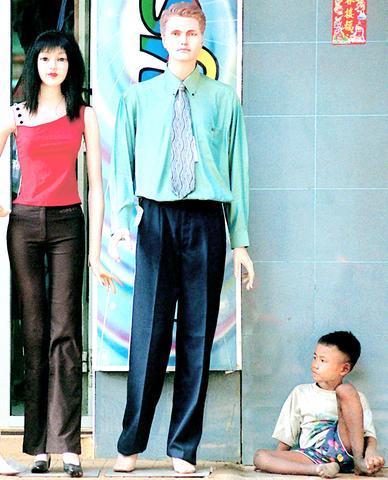While foreign pedophiles cruising war-ravaged Cambodia spark international outrage, a rise in reported child rapes committed by local men hints at a larger crisis scarring Cambodia's youth, activists say.
Child rape is widespread across mainly agricultural Cambodia, they say, in part due to its bloody history and made worse by the kingdom's poverty, corrupt courts and some entrenched traditional values.

PHOTO: AFP
Reports of rape to respected local rights group Licadho have been rising by up to five percent annually for five years, with 83 victims in the first six months of this year alone, including more than a third of whom were aged under 12.
Cambodia remains a traditional Asian society, where virginity is highly prized and family reputation is typically valued above all else, meaning reporting is a difficult task for both victims and their parents.
They often seek out groups such as Licadho to help them with prosecutions fearing that police will not respond properly to their plight.
The increase in reports does not mean rapes are necessarily rising but hints people are starting to speak up about the long-time silent scourge in their communities, Licadho director Naly Pilorge said.
"With the cases we are seeing, it seems that the age of children is getting younger and younger, so one reason for reports going up could be people are getting more angry with those raping younger children," she said.
Another worrying trend is the perpetrators too are growing younger, with 15 percent of those committing rapes in the first half of this year aged 17 or 18. But older men are also to blame: an 81-year-old was charged last month with raping a girl aged 10.
As project manager at a victim treatment center, he sees girls who are physically and emotionally wrecked and attributes their reaction in part to the high value Cambodians place on chastity.
"Our strict culture is one of the causes -- Cambodians value a girl based on her virginity. My patients think that when their virginity is lost, they are like cotton spoiled by mud and their life is meaningless," he said.
Even when reports are made and prosecutions result, Cambodia's infamously inadequate judicial system fails the victims, activists say.
"Perpetrators give money to the victims' families and the complaint is dropped. This only encourages the crime to continue."
Him Yim was forced to come to terms with such a nightmare when her 15-year-old daughter was abducted and repeatedly raped in central Kandal province over a four-month period last year.
When the girl was finally freed, the accused -- a man she knew from her village -- appeared in a lower court but wanted her to accept compensation instead of putting him behind bars.
"The perpetrator wanted to give us money but I didnt accept it because my daughters reputation is worth more than that," Him Yim said.
Meanwhile the man has been freed while awaiting trial, and Him Yim is now seeking legal advice from Licadho.
Rape carries a prison sentence of 10 to 20 years under Cambodian law, but Licadho says courts often charge defendants with indecent assault instead, which carries a maximum sentence of only three years.
"The psychological impact from decades of war is a problem -- people suffered too much and try to find ways to compensate the losses from those days," he said.
As well, many men misguidedly believe having sex with children can cure diseases, he added.

Late last month Philippines Foreign Affairs Secretary Theresa Lazaro told the Philippine Senate that the nation has sufficient funds to evacuate the nearly 170,000 Filipino residents in Taiwan, 84 percent of whom are migrant workers, in the event of war. Agencies have been exploring evacuation scenarios since early this year, she said. She also observed that since the Philippines has only limited ships, the government is consulting security agencies for alternatives. Filipinos are a distant third in overall migrant worker population. Indonesia has over 248,000 workers, followed by roughly 240,000 Vietnamese. It should be noted that there are another 170,000

Hannah Liao (廖宸萱) recalls the harassment she experienced on dating apps, an experience that left her frightened and disgusted. “I’ve tried some voice-based dating apps,” the 30-year-old says. “Right away, some guys would say things like, ‘Wanna talk dirty?’ or ‘Wanna suck my d**k?’” she says. Liao’s story is not unique. Ministry of Health and Welfare statistics show a more than 50 percent rise in sexual assault cases related to online encounters over the past five years. In 2023 alone, women comprised 7,698 of the 9,413 reported victims. Faced with a dating landscape that can feel more predatory than promising, many in

“This is one of those rare bits of TikTok fitness advice with a lot of truth behind it,” says Bethan Crouse, performance nutritionist at Loughborough University. “Sometimes it’s taken a bit too literally, though! You see people chugging protein drinks as they’re scanning out of their gym.” Crouse recommends the athletes she works with consume 20-30g of protein within 30-60 minutes of finishing a resistance training session. “The act of exercising our muscles increases the breakdown of muscle proteins,” she says. “In order to restore, or hopefully improve them — and get gains such as increased muscle mass or strength —

“Far from being a rock or island … it turns out that the best metaphor to describe the human body is ‘sponge.’ We’re permeable,” write Rick Smith and Bruce Lourie in their book Slow Death By Rubber Duck: The Secret Danger of Everyday Things. While the permeability of our cells is key to being alive, it also means we absorb more potentially harmful substances than we realize. Studies have found a number of chemical residues in human breast milk, urine and water systems. Many of them are endocrine disruptors, which can interfere with the body’s natural hormones. “They can mimic, block